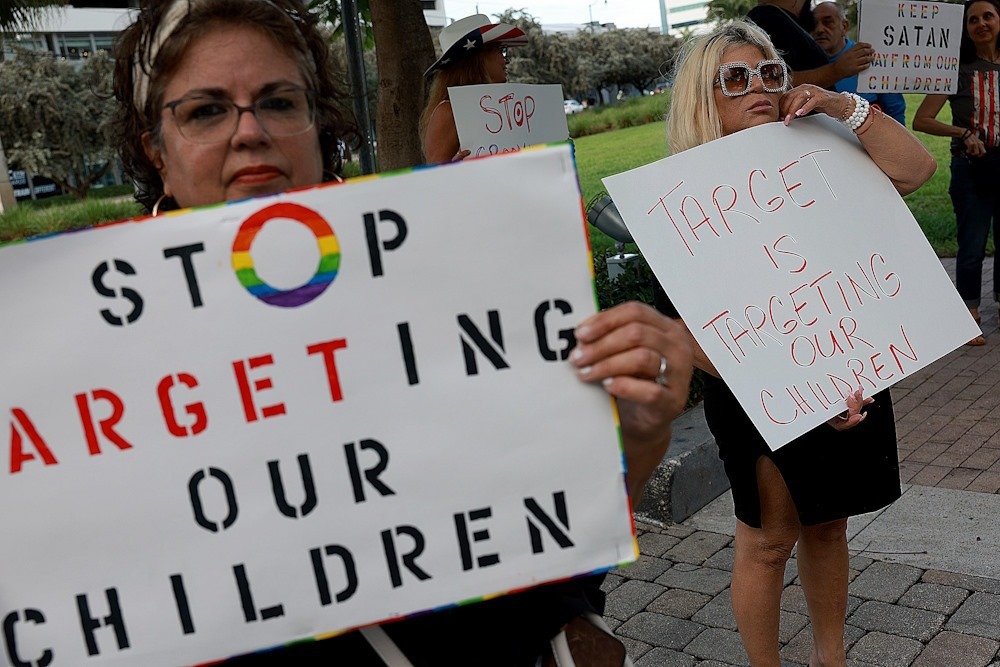‘Anti-woke’ shareholders are targeting boards of companies

Companies are being rattled by a new form of shareholder activism: individuals who oppose woke ideologies.
Shareholders at numerous major companies, ranging from GE Aerospace to UPS, are currently voting on proposals that challenge environmental and social initiatives. Investors supported by conservative groups are taking legal action against Target and other companies due to their progressive positions. Companies are shifting their attention away from diversity, equity, and inclusion initiatives due to the legal and political challenges these programs face.
The activists present the push as a means of removing politics from business—and imply that we should become accustomed to this idea. “We, who have a preference for corporate behavior free from partisan influence, have recently become more engaged in the game after a period of inactivity,” stated Scott Shepard, the general counsel at the National Center for Public Policy Research (NCPPR), a conservative think tank that has put forth numerous shareholder measures scrutinizing corporate initiatives related to climate, diversity, and other topics.
Supporters of progressive environmental, social, and corporate-governance shareholder proposals argue that the newcomers are driven by political motives. They also point to research indicating that well-established ESG measures can enhance long-term financial performance in companies.
According to Sarah Kate Ellis, the CEO of Glaad, supporting ESG work is not only the right thing to do, but it is also crucial for the success and longevity of your business. In an interview in April, she emphasized the importance of this for businesses.
According to data from ISS-Corporate, a unit of proxy adviser Institutional Shareholder Services, there has been a significant increase in the number of measures opposing traditional ESG initiatives at S&P 500 companies. Shareholders have voted on 70 such measures through the end of May this year, compared to 30 two years ago and seven in 2020. Many individuals are advocating for increased corporate oversight of diversity and inclusion efforts, as well as greater donations to LGBTQ groups.
Proxy proposals have seen an increase in recent years, with shareholders filing more of them. This rise can be attributed to the growing social and political nature of the topics being proposed. However, the growth of anti-ESG proposals surpassed that of other categories monitored by ISS. Opponents of ESG have not been successful in convincing voting investors. The majority of anti-ESG proposals have garnered support from less than 2% of shares voted, and so far, none of them have been successful. This performance ranks among the lowest in the categories monitored by ISS.
These shareholder proposals are part of a broader conservative activist campaign aimed at companies in recent years. In some instances, these campaigns have negatively impacted sales by drawing companies into contentious cultural and political discussions.
Last year, Bud Light’s position as the leading beer brand in the U.S. was relinquished due to a boycott by certain consumers following a social-media promotion involving a transgender influencer, which sparked controversy. Target experienced a decline in sales during the previous summer due to its decision to scale back on its Pride-month merchandise displays. This move received criticism from both supporters and detractors, resulting in offense on both sides. Target is also dealing with a shareholder lawsuit related to the Pride collection.
The majority of shareholder proposals tend to be unsuccessful, regardless of the political factors involved. Of the approximately 470 shareholder proposals that were voted on this year, only about three dozen received majority support. The majority of these proposals were related to corporate-governance changes, with a primary focus on eliminating supermajority voting requirements. When a significant majority of shares show support, companies can be motivated to make changes.
Supporters of the anti-ESG proposal are employing tactics reminiscent of those used by ESG proponents. They are leveraging shareholder pressure to advocate for changes in corporate policies, arguing that these policies could potentially pose financial risks. “They emphasize the potential negative impact of reputational risk on firm value,” stated Doug Chia, the president of consulting firm Soundboard Governance. They argue that taking such action could result in a public relations disaster, leading to consumer boycotts and a decline in stock prices.
Certain types of ESG proposals initially received little support, but gradually gained momentum. Today, a significant portion of shares at large companies are frequently voted in favor of measures that call for greater transparency and control over political spending. This represents a substantial increase from the levels seen in 2005. From time to time, someone manages to secure the majority’s support.
One significant factor to consider is the growing support from pension funds and other large institutional investors for a range of proposals related to environmental, social, and governance (ESG) issues, including climate change and social concerns. Research has indicated a correlation between these risks and long-term shareholder returns.
Two notable proposals that have gained significant support this year include one urging UPS to provide a report on the risks associated with voluntary carbon-reduction commitments, which received a 7.9% vote in favor, and another requesting IBM to report on the risks of conducting business in China, with a 5.6% vote in favor. A request for Ford to provide a report on child labor in its supply chain also received approximately 5.6% of votes.
NCPPR, the organization behind these proposals, has been responsible for more than half of the anti-ESG shareholder proposals in the past three years, according to data from ISS. Several other groups put forward the remaining proposals. NCPPR also requested reports on diversity efforts and carbon-reduction risks from several companies, such as PepsiCo, Coca-Cola, Citigroup, UPS, and GE Aerospace.
NCPPR, funded by individuals and conservative groups, has also suggested implementing oversight for charitable donations and partnerships involving diversity and LGBTQ organizations at major retailers like Walmart, Target, and Best Buy.
Shareholders at Best Buy will not be voting on the proposal, as the retailer reached an agreement with NCPPR to exclude it from the ballots. The electronics retailer acknowledged that any contributions would undergo screening to ensure they do not endorse or back the causes or agendas that have been identified as concerning, as stated in the correspondence included in financial filings.
“Our approach to giving to LGBTQIA+ organizations remains consistent,” stated a spokesperson from Best Buy. She chose not to provide further details regarding the causes or agendas that the retailer has committed to vet for support.
Several shareholder proposals often fail to reach a voting stage, as companies block them or their sponsors withdraw them, sometimes after negotiations. According to ISS data, proposals that oppose ESG initiatives have a significantly lower chance of being withdrawn by their sponsors and a higher likelihood of reaching a vote. This trend was observed in approximately six out of every seven measures through May of this year.
When companies strive to protect themselves from conservative activists, they may encounter resistance from both customers and employees. According to documents viewed by The Wall Street Journal, workers at Target expressed their disappointment over the company’s decision to reduce its collection of Pride month merchandise. They signed a letter to leadership and used internal Slack channels to voice their complaints.
In May, during a virtual town hall to discuss this year’s collection, certain employees expressed dissatisfaction with the disabled chat functions and their inability to ask live questions. This has been a recurring issue in meetings since last year’s Pride conflict. “I’m curious about the reasoning behind your decision to give in to the critics,” expressed an employee in a Slack conversation.
According to individuals familiar with the situation, Target’s leadership is actively emphasizing the company’s ongoing support for LGBTQ communities and its participation in Pride month events.
According to a Target spokesman, there has been a noticeable decrease in the amount of negative feedback surrounding the Pride collection this year compared to last year.
This year, Pride merchandise is being sold in approximately half of the retailer’s nearly 2,000 stores, with certain items exclusively available for purchase online. According to the spokesman, the stores that sold Pride merchandise this year made up approximately 90% of the total sales in both 2023 and 2022.
Target is dedicated to providing ongoing support to the LGBTQ community, both during Pride month and throughout the year. This commitment is demonstrated through donations, internal programs, and sponsorship of Pride events across the nation, as stated by the spokesperson.










